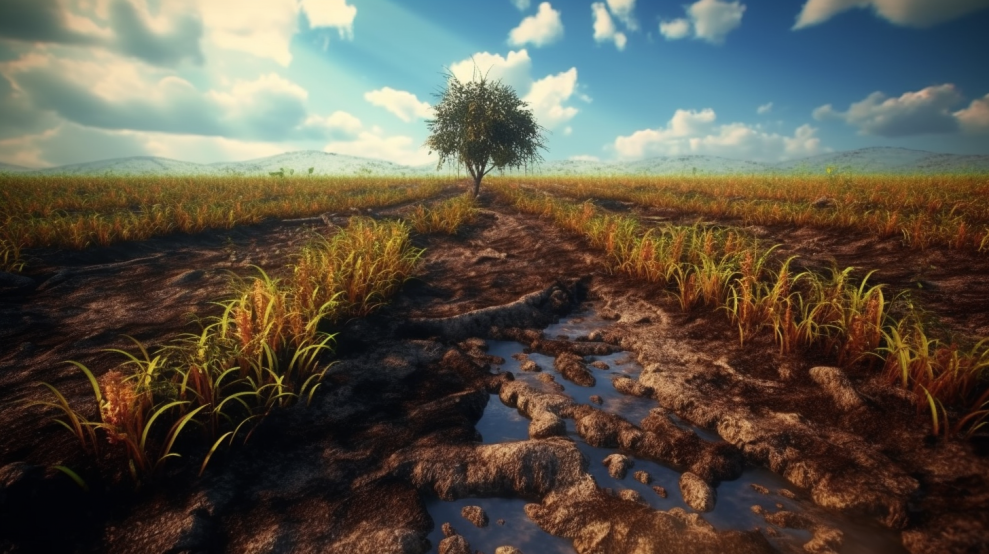Drought and desertification are major environmental challenges that affect many regions around the world, including South Africa. Drought is a natural phenomenon characterized by a prolonged period of dry weather resulting in a shortage of water. On the other hand, desertification refers to the degradation of once-fertile land into a desert-like environment. Drought and desertification are closely related since drought conditions often lead to land degradation, which in turn results in desertification.
South Africa has experienced numerous droughts in recent years, with the most severe drought occurring from 2015 to 2018. The drought had a significant impact on the country’s agricultural sector, resulting in crop failures, livestock losses, and a decline in the country’s GDP. Desertification is also a significant issue in South Africa, with about 66% of the country’s land classified as semi-arid or arid. This article will suggest management strategies for drought and desertification, with a particular focus on South Africa.
Management Strategies for Drought
Water conservation and management
Water conservation and management are essential strategies for mitigating the effects of drought. South Africa is a water-scarce country, and water conservation is crucial to ensure that there is enough water to meet the needs of its citizens, industries, and agriculture. Water management involves the efficient use and allocation of water resources, including the development of new water sources such as groundwater and desalination plants.
Drought-resistant crops
Another management strategy for drought is the use of drought-resistant crops. Farmers in South Africa can switch to drought-resistant crops that require less water to grow, such as sorghum, millet, and maize. These crops can help farmers cope with drought conditions and reduce the impact of crop failures on their livelihoods.
Irrigation systems
Irrigation systems are also crucial in mitigating the effects of drought. South Africa has invested in various irrigation systems, such as drip irrigation and pivot irrigation, to improve water efficiency and reduce water wastage. These systems help farmers conserve water by delivering water directly to the plant’s roots, reducing evaporation and runoff.
Rainwater harvesting
Rainwater harvesting is another effective strategy for managing drought conditions. This involves collecting rainwater during the rainy season and storing it for use during the dry season. Rainwater harvesting can help farmers and households reduce their dependence on municipal water sources and alleviate water scarcity during droughts.
Management Strategies for Desertification
Reforestation and afforestation
Reforestation and afforestation are essential strategies for mitigating the effects of desertification. Trees play a critical role in preventing soil erosion, improving soil fertility, and reducing the effects of climate change. In South Africa, reforestation and afforestation programs have been implemented to restore degraded lands and prevent further desertification.
Conservation agriculture
Conservation agriculture is another strategy for managing desertification. This involves adopting farming practices that reduce soil erosion, improve soil fertility, and conserve water. Conservation agriculture techniques include minimum tillage, crop rotation, and the use of cover crops. These practices can help farmers improve soil health and increase crop yields in degraded lands.
Land restoration
Land restoration is a critical strategy for managing desertification. This involves restoring degraded lands to their natural state through re-vegetation, erosion control, and soil conservation. In South Africa, the Working for Land program has been implemented to restore degraded lands and provide employment opportunities for local communities.
Sustainable land management
Sustainable land management is another important strategy for managing desertification. This involves adopting land use practices that are environmentally sustainable, socially acceptable, and economically viable. Sustainable land management practices include agroforestry, sustainable grazing, and the use of drought-resistant crops. These practices can help farmers and communities adapt to changing climate conditions and prevent further land degradation.
Drought and Desertification Management Strategies in South Africa
Integrated Water Resource Management (IWRM)
South Africa has implemented Integrated Water Resource Management (IWRM) as a strategy for managing water resources. IWRM involves the coordinated development and management of water resources to ensure social, economic, and environmental sustainability. The implementation of IWRM has helped South Africa to improve water efficiency, reduce water wastage, and enhance water conservation.
Climate-smart agriculture
South Africa has also implemented climate-smart agriculture practices to help farmers adapt to changing climate conditions. Climate-smart agriculture involves the adoption of practices that increase agricultural productivity, enhance resilience to climate change, and reduce greenhouse gas emissions. Some of the climate-smart agriculture practices being promoted in South Africa include conservation agriculture, agroforestry, and the use of drought-resistant crops.
Working for Water and Working for Land programs
South Africa has implemented the Working for Water and Working for Land programs as part of its land restoration and conservation efforts. The Working for Water program aims to control the spread of invasive alien plants, which contribute to land degradation and water scarcity. The Working for Land program aims to restore degraded lands and provide employment opportunities for local communities.
National Drought Management Strategy
South Africa has also developed a National Drought Management Plan to guide its drought management efforts. The strategy outlines the roles and responsibilities of different stakeholders, including government departments, communities, and private sector organizations, in managing drought conditions. The strategy focuses on water conservation, drought-resistant crops, and effective water allocation and management.
Conclusion
Drought and desertification are significant environmental challenges that affect many regions around the world, including South Africa. The management of drought and desertification requires a holistic approach that integrates environmental, social, and economic considerations. South Africa has implemented various strategies to manage drought and desertification, including water conservation and management, the use of drought-resistant crops, reforestation and afforestation, conservation agriculture, and sustainable land management. These strategies have helped to improve water efficiency, increase agricultural productivity, enhance land restoration efforts, and provide employment opportunities for local communities. Continued efforts and investments are required to ensure the sustainability of these strategies and mitigate the effects of drought and desertification in South Africa.

